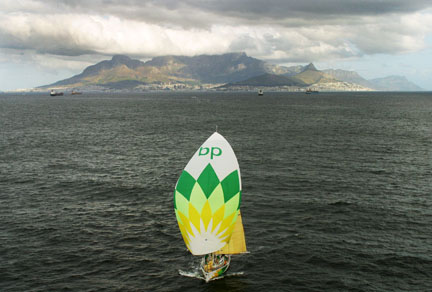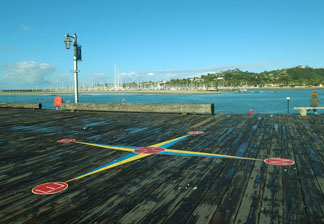 |
 |
Photo of the DayMay 2 - Cape Town, South Africa Today's Photo of the Day is of one of the amateur-crewed entries in the Global Challenge 2004/5 departing Cape Town, South Africa, with cloud-shrouded Table Mountain in the background. Lovely, no?  Photo courtesy onEdition Photography |
America's Cup Fever Alive And Well, With 12 Official EntriesMay 2 - Valencia, Spain |
Two Teenagers Saved After Six Days In The Atlantic On A SunfishMay 2 - Atlantic Ocean |
Port Captains In Mexico Told To Obey Directive That Eliminated Domestic ClearingMay 2 - Mexico City Tere Grossman of Marina San Carlos, and five other members of the Mexico Marina Owners Association, traveled to Mexico City for meetings with government officials on April 25-26 to work out the implementation of the new reglamente that eliminates 'domestic clearing' as it had been known - and hated - by cruisers in Mexico. The April 19 reglamente (or directive) from President Fox stated that as of that date, mariners would no longer have to jump through the traditional port captain to immigration to aduana to the bank and back to port captain hoops while tossing money in the air just because they had arrived in a new port captain jurisdiction. Thanks to the directive, all that's required now is that the port captain or a marina be "informed" of the arrival or departure of a vessel. (This does not, of course, eliminate the need for a boat to clear into Mexico at the first port of entry, and out of Mexico at her last port in Mexico.) The big question everyone wanted answered, of course, is what constitutes "informing" a marina or port captain. Can it be done over the radio - as Grossman is battling for - or will the port captain or marina have to be visited during working hours and something put in writing? A final written decision is expected in a week or two. How this question is answered will determine if the new rule is a complete victory for visiting mariners or just a partial victory. Other issues discussed included what to do about boats that are already in Mexico but which no longer have their clearing papers from their original port of entry. What to do with boats that are trailered into Mexico. And whether port captains can require that mariners use a ship's agent when clearing into Mexico for the first time and clearing out of Mexico. Grossman was promised that port captains won't be able to require that mariners use agents, but she hasn't got it in writing yet. The new rules took effect on April 19, but compliance has not been universal on the part of port captains. Grossman reports that Jose Lozano, the Executive Director of Mexico's Merchant Marine, reiterated that the new policy indeed went into effect on April 19, and said that all port captains were reminded of the change in policy a week later. Grossman tells Latitude that Lozano is asking all mariners to provide him with specifics if any port captain tells them - as some have - that the policy doesn't take effect for a few months, or that a ship's agent can be required to "inform" marinas and/or port captains of arrivals and departures, or if any other aspects of the old system are required. So if you come across a port captain who is not adhering to the new policy, carefully note the specifics - what port captain, what district, the date, the time, the name of your boat, and your name. For the time being, send this information to richard, and we'll get that information to Lozano. We hope to have a direct email address for Lozano in a day or two. But the bottom line is that port captains will not be permitted to ignore implementation of the reglamente. |
Only You Can Make Sure Domestic Clearing Stays Eliminated!May 2 - Mexico While the new regulations are sensational
news for cruisers, make no mistake that some folks are very unhappy
about it. Among them: Because the new policy came in the form
of a reglamente rather than a new law, it's possible - although
not probable - that it could be rescinded at some time in the
future. This is why we could use everyone's help once again.
You see, during her visit to Mexico City, Grossman presented
Lozano with copies of more than 100 emails - most of them from
Latitude readers - in support of the reglamente. He was
very impressed. The large number of favorable emails was also
reported on in the Mexico City newspapers. |
The Secrets on How to Come North from Southern CaliforniaMay 2 - Santa Barbara Doña de Mallorca and her crew on
Profligate made the trip north from Santa Barbara to Sausalito
last Friday with the greatest of ease. The secrets, as always,
were patience and timing, as the crew encountered no wind and
flat seas.  Santa Barbara Yacht Harbor, as seen from the compass rose on Stearns Wharf, on departure morning after a night of rain.  By the way, check out the Southern California sunset, with the orange ball dropping behind West End, Catalina. Photos Latitude/Doña |